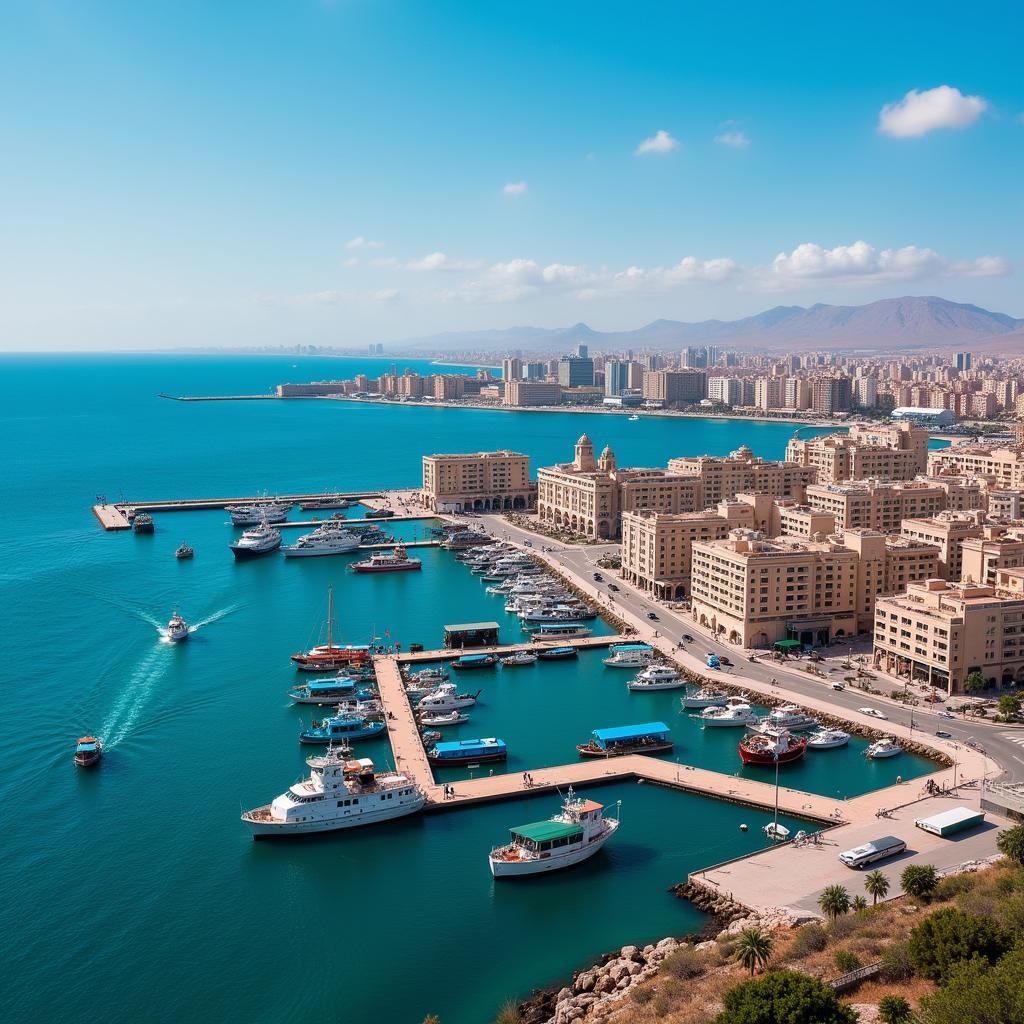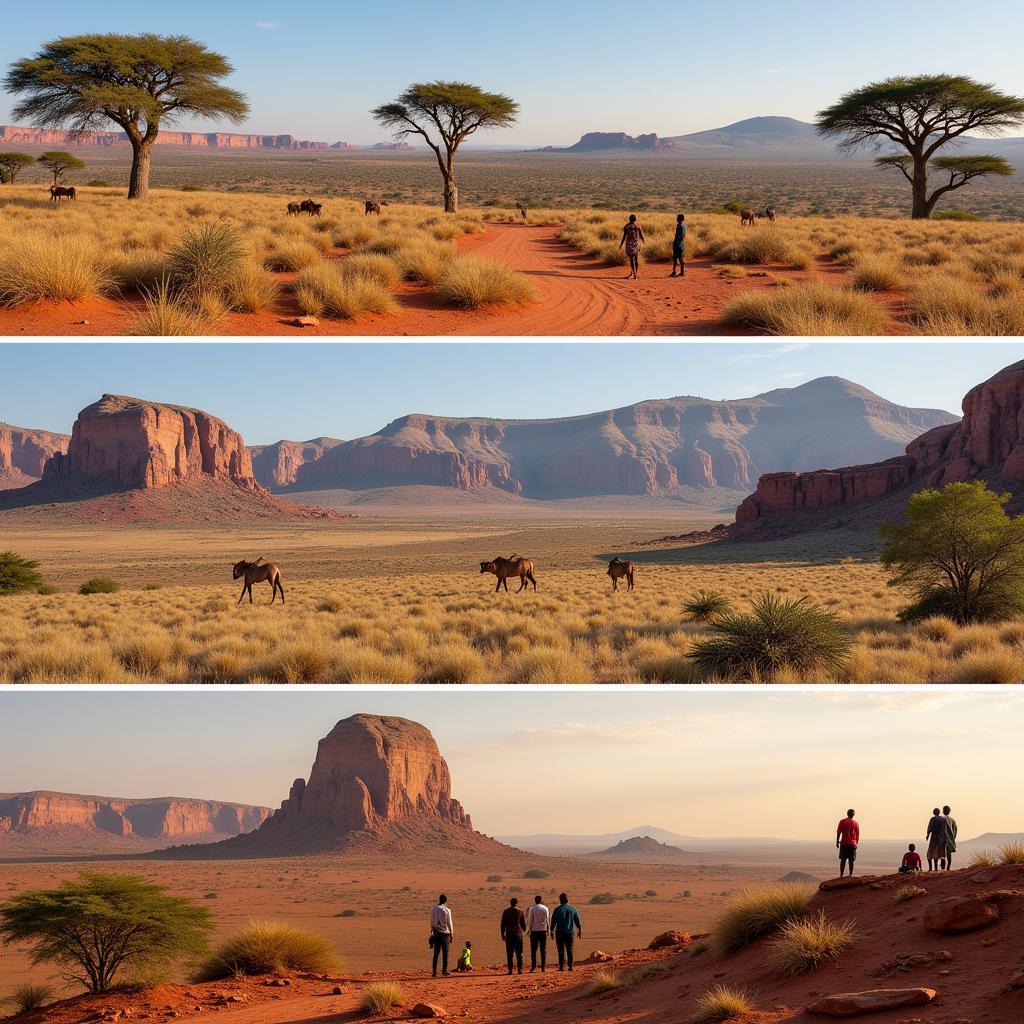Exploring African Countries Bordering the Mediterranean Sea
The Mediterranean Sea, a cradle of civilizations, laps against the shores of several African countries, each with its unique story to tell. These African countries bordering the Mediterranean Sea boast a rich tapestry of cultures, histories, and natural landscapes, shaped by their proximity to this historic waterway. This article delves into the fascinating world of these nations, exploring their diverse characteristics and the impact of their Mediterranean location.
The nations of North Africa that border the Mediterranean Sea include Egypt, Libya, Tunisia, Algeria, and Morocco. These countries share not only a coastline but also a complex interplay of historical influences, from ancient empires to colonial powers, which have shaped their present-day identities. Their strategic location along this vital trade route has resulted in a melting pot of cultures, evident in their languages, architecture, and traditions. For centuries, the Mediterranean has served as a bridge connecting Africa with Europe and the Middle East, fostering cultural exchange and trade. This interaction has left an indelible mark on the African countries along its shores.
The Gateway to Africa: Egypt
Egypt, a land of pharaohs and pyramids, boasts a significant Mediterranean coastline. The Nile Delta, a fertile agricultural region, opens into the Mediterranean, providing a crucial link to the sea. Alexandria, a historic port city founded by Alexander the Great, serves as a testament to Egypt’s long-standing connection to the Mediterranean. The sea has played a crucial role in Egypt’s history, facilitating trade and cultural exchange for millennia.
The Ancient Maritime Power
Egypt’s ancient civilization flourished along the Nile and extended its influence across the Mediterranean. Their maritime prowess allowed them to establish trade routes and interact with other civilizations, contributing to their cultural and economic development.
Libya’s Mediterranean Coastline
Libya, with its vast desert landscapes, also possesses a significant Mediterranean coastline. Its strategic location has made it a crossroads of cultures and a historical battleground. The Mediterranean has influenced Libya’s economy, particularly through fishing and maritime trade.
Coastal Cities and Trade
Libya’s coastal cities, such as Tripoli and Benghazi, have historically served as important centers of trade and cultural exchange. The Mediterranean has provided a vital link to the outside world, shaping the development of these urban centers. Understanding the interplay between geography and history is crucial to understanding the development of these nations. See more information about African features by country.
 Tripoli, Libya – A Mediterranean Port City
Tripoli, Libya – A Mediterranean Port City
The Maghreb Nations: Tunisia, Algeria, and Morocco
The Maghreb region, encompassing Tunisia, Algeria, and Morocco, boasts a diverse range of landscapes and cultures along the Mediterranean coast. From the ancient ruins of Carthage in Tunisia to the bustling souks of Marrakech in Morocco, the Maghreb offers a glimpse into the rich history and vibrant present of these North African nations. These African countries bordering the mediterranean sea have been shaped by their unique geographic and historical context. Learn more about African international relations and how these countries interact with the global community.
Cultural Crossroads
The Maghreb has been a crossroads of civilizations for centuries, with influences from Berber, Arab, European, and African cultures. This blend of cultures is reflected in the region’s architecture, cuisine, music, and traditions. The Mediterranean has played a key role in shaping this cultural melting pot, facilitating trade and the exchange of ideas. More information on African countries and capital cities can be found here.
Conclusion
The African countries bordering the Mediterranean Sea offer a captivating blend of history, culture, and natural beauty. From the ancient wonders of Egypt to the vibrant cities of the Maghreb, these nations provide a unique glimpse into the diverse tapestry of Africa. Understanding the significance of the Mediterranean’s influence on these countries is key to appreciating their rich and complex identities. The African countries bordering the Mediterranean Sea continue to play a vital role in the region’s dynamic present and future. You can explore more information about African countries bordering the Mediterranean Sea.
FAQ
-
Which African countries border the Mediterranean Sea?
Egypt, Libya, Tunisia, Algeria, and Morocco. -
How has the Mediterranean Sea influenced these countries?
It has shaped their trade, culture, and historical interactions. -
What are some key historical sites along the Mediterranean coast of Africa?
Alexandria in Egypt, Carthage in Tunisia, and ancient cities along the Libyan coast. -
What are the major economic activities in these countries related to the Mediterranean?
Fishing, tourism, and maritime trade. -
What are some of the cultural influences found in the Maghreb region?
Berber, Arab, European, and African cultures. -
What is the importance of the Nile Delta in relation to the Mediterranean Sea?
It provides a crucial link between the Nile River and the Mediterranean, supporting agriculture and trade. -
How has the strategic location of these countries impacted their history?
It has made them crossroads of trade and cultural exchange, but also subjects of conquest and conflict.
Scenarios
- Scenario 1: A traveler planning a trip to North Africa wants to know which countries offer Mediterranean experiences.
- Scenario 2: A student researching the history of trade routes wants to understand the role of the Mediterranean in connecting Africa to other continents.
- Scenario 3: A business person is interested in exploring investment opportunities in the tourism sector along the Mediterranean coast of Africa.
Further Exploration
For more information about specific African countries, you can visit our African countries wiki. If you are interested in learning more about the diverse features of each country, explore our page on African features by country.
Contact Us
For assistance, please contact us at Phone: +255768904061, Email: kaka.mag@gmail.com, or visit us at Mbarali DC Mawindi, Kangaga, Tanzania. Our customer service team is available 24/7.
